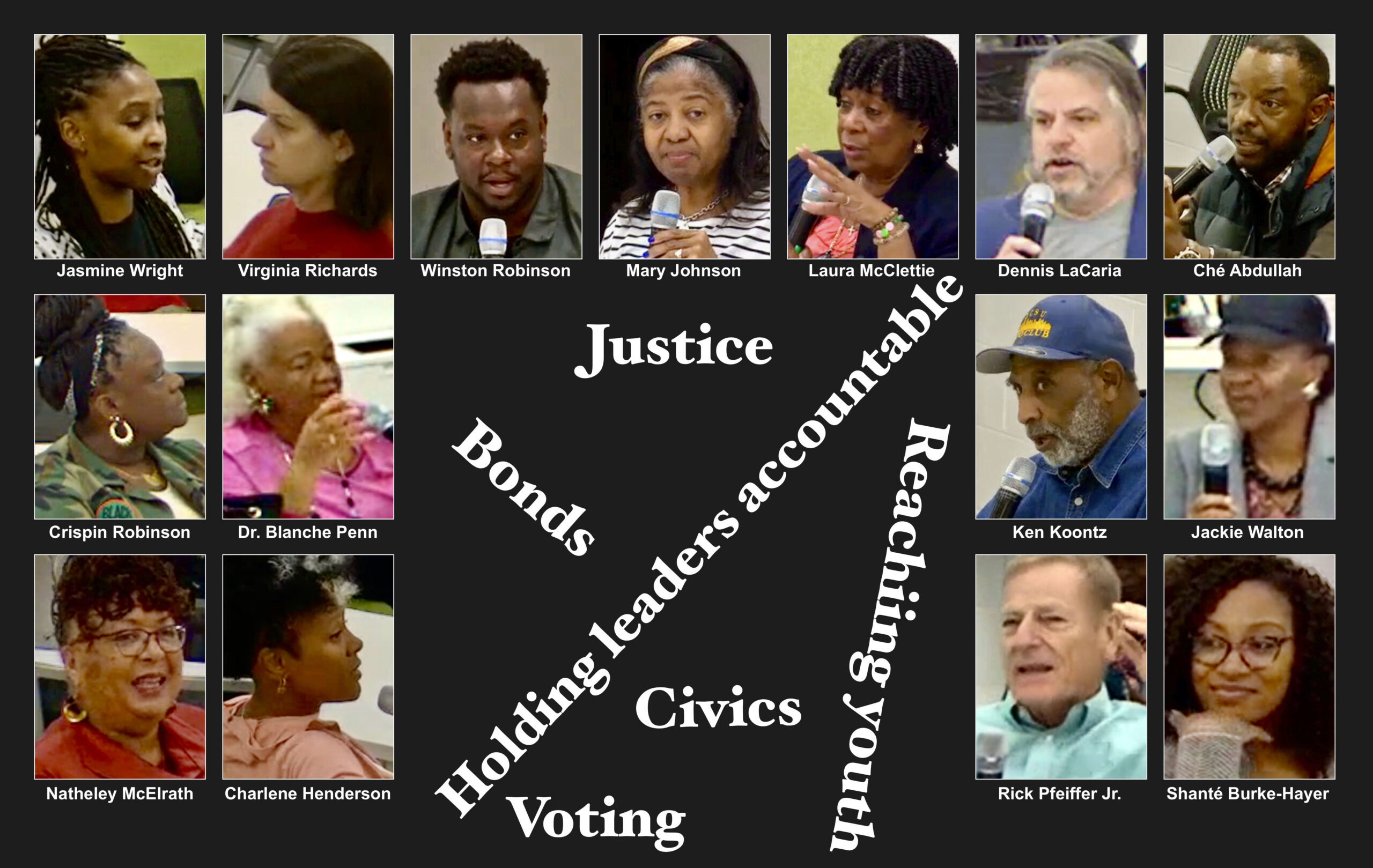
Oct. 24, 2023
It was a small crowd that attended or listened to this morning’s Forum. But a wide variety of issues were aired. If there was news made, it might have been that a last-minute inform-the-voters effort is under way to shore up support for the school bonds.
The District 6 City Council candidate forum scheduled earlier was cancelled because neither candidate could attend. The Oct. 31 Forum was earlier set aside for at-large City Council candidates.
Rick Pfeiffer Jr., who retired to Charlotte in about 2018 from Ohio, offered views shaped by having served as elected city attorney in Columbus, a city older than Charlotte but about the same size. He suggested that, to bolster local governance, Charlotte needs to pay its elected officials for the full-time work they do, and allow them to hire their own staff so they are not totally dependent on City Hall officials for their information.
And District Court Judge Shanté Burke-Hayer fielded a number of questions about court issues and ensuring that sentences support restoration, not just confinement, of persons who come before the courts.
School bonds
Two issues dominated the morning’s discussion. One was the upcoming school bond referendum on the Nov 7 ballot. Public conversation has focused on the cost – higher tax bills in upcoming years that may uproot low-income homeowners and turbocharge gentrification in close-to-downtown neighborhoods.
While there were some specific questions raised by Forum participants, the discussion appeared fueled by a realization within CMS that the outside advocacy group tasked months ago with making a case for the bonds had not reached voters with enough information.
Dennis LaCaria, CMS executive director of facilities planning and real estate, said he had been in 60 meetings with public and private groups thus far in October, answering questions about the district’s construction needs. He did not say how many other CMS employees have been assisting. CMS may not use its staff or money to advocate for the bonds’ passage, but can explain projects and offer context. Examples of context offered by LaCaria: CMS reviews its construction projects list annually, and sometimes one school gets fixed earlier than originally estimated because of needs that develop during the year. The bond issue will address about 30 projects, but the full list of needs is well over 100.
When two individuals raised the issue of school safety, LaCaria offered a detailed explanation of how safety is a key issue in new-school design, and a key reason why older schools with outside doors to every classroom are being replaced, not renovated; why there will be no more high school campuses with buildings scattered about; why even Myers Park High will one day be replaced by a single building.
In the video are numerous examples of basic school construction facts that could have been being shared with voters for months, but are only now getting aired.
Holding leaders accountable
A perennial issue at open forums has been: How can community groups listen to what candidates promise, keep track of how the successful ones behave once elected, and then hold those elected officials to account if they fail to make good on their promises?
Discussion of this topic invariably energizes Forum participants every time it comes up.
But the Forum in its 40-plus years has never settled on a good way to address the problem. Part of the reason is that tracking voting records and an individual’s post-election statements takes persistence and more time than most groups can muster. Some might say that even media outlets have cut way back on their coverage that might promote leadership accountability.
Forum issues
Forum facilitators raised two issues that they are wrestling with, but got little help from the audience.
One issue was how to have more people attend the Forum in person. Forums are held only during midmornings on Tuesdays, making participation impossible for most workers. And facilitator Laura McClettie acknowledged that leaders chose to shut down the virtual meeting room used during Covid because they wanted to return to exclusively in-person conversation. Attendance numbers show a fair number of people listening to livestreams of Forum meetings, but the Forum has declined to make it easy for listeners to ask questions.
The other issue was how to engage in the 2024 election cycle, which begins with candidate filing in December, involves a cascade of offices, and features primaries and other events very early in 2024. Facilitator Jackie Edwards Walton said the Forum was likely the first community group more than 40 years to engage in comprehensive candidate forums. Now there are so many forums that candidates cannot attend them all.
Virginia Richards did not speak this morning, but was in the room. This Chapel Hill-trained lawyer and professional photographer is working on a project exploring the first years of CMS desegregation, a period when she was a CMS student. Longtime friends suggested that she might find, at or through the Forum, other people with reflections that would inform her work. Any contact information she provides later will be added here.